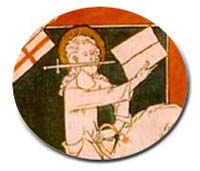Forgotten Truths
 |
 |
 |
 |
 |
 |
 |
The Catholic Church Is Not a Republic
When we see Pope Francis and his Council of Eight (here & here) impose collegiality and democracy in the Church by denying the traditional primacy of jurisdiction and teaching of the Sovereign Pontiff, we want to offer our readers documents of past Popes teaching precisely the opposite.
Today, we transcribe the Brief Super soliditate of November 28, 1786 by Pope Pius VI. In this brief he addresses the errors of Austrian Fr. Joseph Valentin Eybel. His writings renewed the old errors of Febronius, who denied the monarchical constitution of the Church.
Today, we transcribe the Brief Super soliditate of November 28, 1786 by Pope Pius VI. In this brief he addresses the errors of Austrian Fr. Joseph Valentin Eybel. His writings renewed the old errors of Febronius, who denied the monarchical constitution of the Church.
Pope Pius VI
What must be greatly deplored is the precipitous and blind temerity of one [Eybel] who would strive to renew with his deplorable libel all the errors condemned by the decrees, of one who has stated and insinuated with great prolixity in various places the following errors:
- that every Bishop, as much as the Pope, was called by God to govern the Church and was granted the same power;
- that Christ granted the same authority to all the Apostles, and everything that one believes can be obtained from and granted by the Pontiff alone can also be obtained from any Bishop – either by virtue of his consecration or ecclesiastical jurisdiction;
- that Christ would have desired that the Church be administered like a republic and, since this system of government requires a president for the sake of unity – that is, one who, without daring to meddle in the affairs of the other authorities, shares the powers of government – he conserves the privilege of exhorting the negligent to fulfill their duties. For the power of the Primate consists only in the prerogative of compensating for the negligence of others and assuring that unity is preserved by means of exhortation and example;
- that the Pontiff has no power in other Dioceses, except in an extraordinary case;
- that the Pontiff is the head which receives from the Church its strength and stability;
- that the Pontiffs permitted themselves to violate the rights of Bishops and to reserve for themselves absolutions, dispensations, decisions, appeals, the granting of benefits, in short, all the functions which Eybel now enumerates one by one as either inappropriate or as restrictions injurious to the Bishops.

(Pius VI, Brief Super soliditate
of November 28, 1786, in DR 1500
of November 28, 1786, in DR 1500
Posted November 16, 2013












